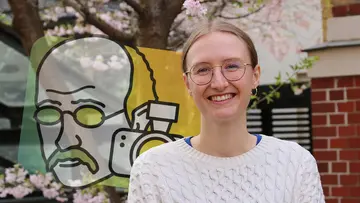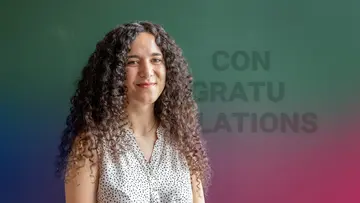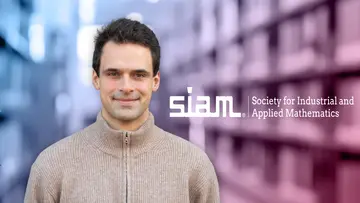
Erfolgreicher Start in eine vielversprechende Karriere
Veröffentlicht am 20.07.2023
Claudia Fevola hat kürzlich ihren PhD zu „Computation and Physics in Algebraic Geometry“ abgeschlossen. Im November wird sie als Postdoctoral Fellow im MATHEXP-Team am Inria Saclay Centre in Frankreich starten. Wir gratulieren zu diesem großen Karriereschritt!
Claudia interessiert sich vor allem für die algebraische Geometrie und deren Verbindung zur Kombinatorik, zur reellen algebraischen Geometrie und nichtlinearen Algebra. Ihre aktuelle Forschung konzentriert sich auf algebraisch-geometrische Fragen in der Teilchenphysik und integrierbaren Systemen.
Ihren Bachelor absolvierte sie an der Università degli Studi della Campania „Luigi Vanvitelli“, ihren Master an der Universität „Federico II“ von Neapel. Sowohl während ihres Bachelor- als auch während ihres Masterstudiums nahm sie am Erasmus-Austauschprogramm teil. Sie verbrachte ein Semester an der Universität Lissabon und anschließend an der Universität Augsburg, bevor sie in die Forschungsgruppe „Nichtlineare Algebra“ einstieg. Ihre Promotion wurde von Bernd Sturmfels und Daniele Agostini betreut.
Claudia beschreibt ihre Forschungsschwerpunkte wie folgt (in englischer Sprache):
Physics provides new, tantalizing problems that we solve by developing and implementing innovative and effective geometric tools in nonlinear algebra. The techniques we employ also rely on numerical and symbolic computations performed with computer algebra.
The Kadomtsev-Petviashvili equation is a partial differential equation describing nonlinear wave motion whose solutions can be built from an algebraic curve. Such a surprising connection established by Krichever and Shiota also led to an entirely new point of view on a classical problem in algebraic geometry known as the Schottky problem. We study solutions to the Kadomtsev-Petviashvili equation that arise from singular curves. To explore the connection with curves with at worst nodal singularities, we define the Hirota variety, which parameterizes KP solutions arising from such curves. Studying the geometry of the Hirota variety provides a new approach to the Schottky problem. We investigate it for irreducible rational nodal curves, giving a partial solution to the weak Schottky problem in this case.
Second, we formulate questions from scattering amplitudes in a broader context using very affine varieties and D-module theory. The interplay between geometry and combinatorics in particle physics indeed suggests an underlying, coherent mathematical structure behind the study of particle interactions. In this thesis, we gain a better understanding of mathematical objects, such as moduli spaces of point configurations and generalized Euler integrals, for which particle physics provides concrete, non-trivial examples, and we prove some conjectures stated in the physics literature.
Finally, we study linear spaces of symmetric matrices, addressing questions motivated by algebraic statistics, optimization, and enumerative geometry. This includes giving explicit formulas for the maximum likelihood degree and studying tangency problems for quadric surfaces in projective space from the point of view of real algebraic geometry.
Wissenschaftlicher Kontakt
Redaktioneller Kontakt
Verwandte Inhalte

Elke Neuhaus Elke Neuhaus

Was wir in der Schule nicht über Mathematik lernen Was wir in der Schule nicht über Mathematik lernen

Nachwuchspreis für Laura Casabella Nachwuchspreis für Laura Casabella





